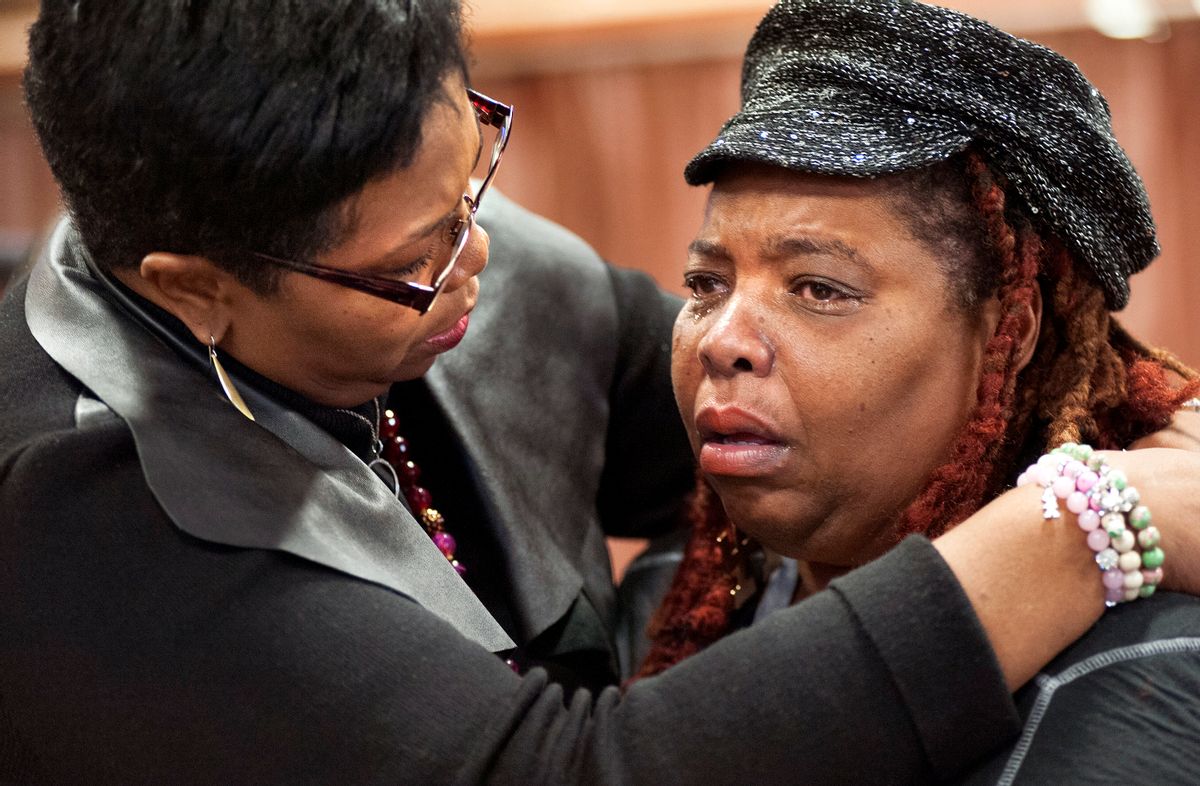ST. LOUIS (AP) — A phone conversation between a St. Louis Rams executive and a county police chief was intended to ease tensions after five players held their hands up during pregame introductions in a show of solidarity with Ferguson protesters.
Instead, the call has opened a new debate over whether the team apologized.
Elsewhere, President Barack Obama and Attorney General Eric Holder called separately for new actions from the federal government stemming from the fatal shooting of a black 18-year-old by a white police officer.
Here's a look at the latest developments in the case:
___
APOLOGY OR NOT?
Kevin Demoff, the executive vice president of football operations for the Rams, tells The Associated Press that he "expressed regret for any perceived disrespect of law enforcement" when he called St. Louis County police Chief Jon Belmar on Monday.
But Belmar says the call went further. According to the St. Louis Post-Dispatch, Belmar told his staff by email that Demoff had apologized on behalf of the team for the "Hands up. Don't Shoot!" gesture some of its players made before kickoff. Since the grand jury's decision not to charge former Ferguson Officer Darren Wilson, protesters have been using the gesture. It's a reference to the account of some witnesses that Michael Brown had his hands in the air when he was shot.
Demoff later denied there was any apology from the team.
"I do believe that supporting our players' First Amendment rights and supporting local law enforcement are not mutually exclusive," he said.
Coach Jeff Fisher also announced Monday that the players wouldn't be disciplined, despite a call from the St. Louis Police Officer's Association that they should.
___
RACIAL PROFILING GUIDANCE
Holder went to Martin Luther King Jr.'s Atlanta church Monday night for his first regional meeting on building trust between law enforcement and communities. Obama had asked him to lead the initiative due to the conflicts in Ferguson.
During his speech at Ebenezer Baptist Church, Holder said in the coming days he would unveil "rigorous new standards — and robust safeguards — to help end racial profiling, once and for all."
Holder has publicly discussed the need to ease tensions between police departments and minority communities. A new pilot program announced weeks after the Ferguson shooting will study racial bias in American cities and recommend ways to reduce the problem.
___
PRESIDENTIAL ACTION
Obama proposed a three-year $263 million spending package to increase use of body cameras, expand training for law enforcement and add more resources for police reform. The package includes $75 million for the small, lapel-mounted cameras to record officers on the job.
The White House has said the cameras could help bridge deep mistrust between law enforcement and the public. It could also help resolve the types of disputes between police and witnesses that arose in the Ferguson shooting.
Brown's family wants to see every police officer working the streets wearing a body camera.
However, Obama is not seeking to pull back federal programs that provide military-style equipment to local law enforcement. He had ordered a review of those programs after critics questioned why police in full body armor with armored trucks responded to dispel demonstrators.
___
STATE COMMISSION MEETS
During the first meeting of the Ferguson Commission, several people in the audience implored members to discuss practical solutions, not murky goals and vision statements.
"People have waited for three months stewing in anxiety and pain," activist Charles Wade said.
Missouri Gov. Jay Nixon appointed the 16-member panel to study the underlying social and economic conditions — from failing schools to high unemployment— that have gained attention since Brown's death.
The panel includes a Ferguson construction-supply company owner, two pastors, a university professor, a community activist and a St. Louis police detective who is also president of the state chapter of the Fraternal Order of Police.
___
WALKOUT PROTEST
As part of a national protest, people walked off their jobs or out of school holding their hands up in a show of support for Ferguson protesters.
Monday's walkouts stretched from New York to San Francisco, and included Chicago and Washington, D.C. At the University of Missouri-St. Louis, three dozen students rallied outside the library and walked out of class.
___
THE CASE
Brown was unarmed when he was killed by Darren Wilson following an Aug. 9 confrontation on a Ferguson street.
The shooting stirred racial tensions and led to numerous protests in Ferguson, a predominantly black community patrolled by a mostly white police force. A grand jury was assembled to investigate the shooting, and its nine white and three black members spent three months hearing more than 70 hours of testimony from 60 witnesses. Their decision not to indict Wilson was announced Nov. 24, prompting violent protests and looting that resulted in at least a dozen commercial buildings being destroyed.



Shares